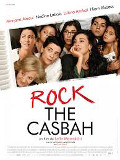
Directed by
Laila Marrakchi
102 minutes
Rated M
Reviewed by
Sharon Hurst

Rock The Casbah
Synopsis: Sofia (Morjana Alaoui), an actress in the USA, returns home to Tangier for the funeral of her father, Moulay Hassan (Omar Sharif). According to Muslim tradition the family must gather in their home for three days to mourn the loss. But with no male heir and no patriarchal hand to rule the roost, Sofia and her two sisters, Miriam (Nadine Labaki) and Kenza (Lubna Azabal), fall to bickering, recriminations along with unacceptable behaviours like drinking. To further conflict the household, their grieving mother Aicha (Hiam Abbass) decides it is time to dismiss Yacout (Fatima Harandi Raouia), the family maid of 30 years.
This warm and lovely narrative is told from the perspective of the deceased with Hassan telling us in the opening section of the film that “I died yesterday”. Similarly he introduces its two subsequent parts with some quasi-philosophical observations on life and death, both as they pertain to him and to us all.
The past rules the present for these women. We discover that there is a dead sister, Laila, who suicided, and also that Yacout has a son, Zakaria (Adel Bencherif) of whom Hassan was excessively fond. While two of the sisters remained in Morocco, both somewhat unhappy in their marriages, only Sofia was able to defy her father and tradition and escape to the USA. Aicha has spent a long marriage making certain compromises that will affect her life long after her husband’s death. Among all the family drama, accusations and back-biting, there is a closeness and warmth, and the clashes are never far removed from love and affection, with all the interactions between mother and daughters, and between the sisters, being tenderly handled and nicely scripted.
The film is also a timely insight into upper class Islamic society – these wealthy people live in a glorious villa overlooking the sparkling sea of Tangier, and Hassan was the acquisitive owner of a number of classic cars. The gardens and interiors of the villa are exquisite. The mourning traditions are likewise fascinating, (and hold interesting similarities to those seen in the currently screening Jewish family drama This Is Where I Leave You). The women are again paradoxically cosmopolitan in that they speak Arabic, French and English and yet remain cloistered within the strictures and expectations of their traditional society. Only Sofia has made a true break, whilst the others find it difficult to affirm their individuality. Despite appearing to be liberated women, they are still subject to male-dominated traditions and laws but in this story, with the death of Hassan there are signs of generational change.
Some may see the film as a soapie but I found it insightful with themes of compassion, redemption and family connectiona looming large and wonderful and varied performances. The dignified interpretations of Aicha and Yacout stand out whilst the wisdom and affection of the grandmother is a delight. A strong positive also is the soundtrack, especially the use of a song titled “Oh My Darling Father, Rescue Me” used to moving effect over the final credits.
Perhaps the one odd choice is to have Sofia’s young, American-born son able to see and interact with the ghost of his Grandpa but this is a minor quibble in light of all the other positives.

Want more about this film?


Want something different?




